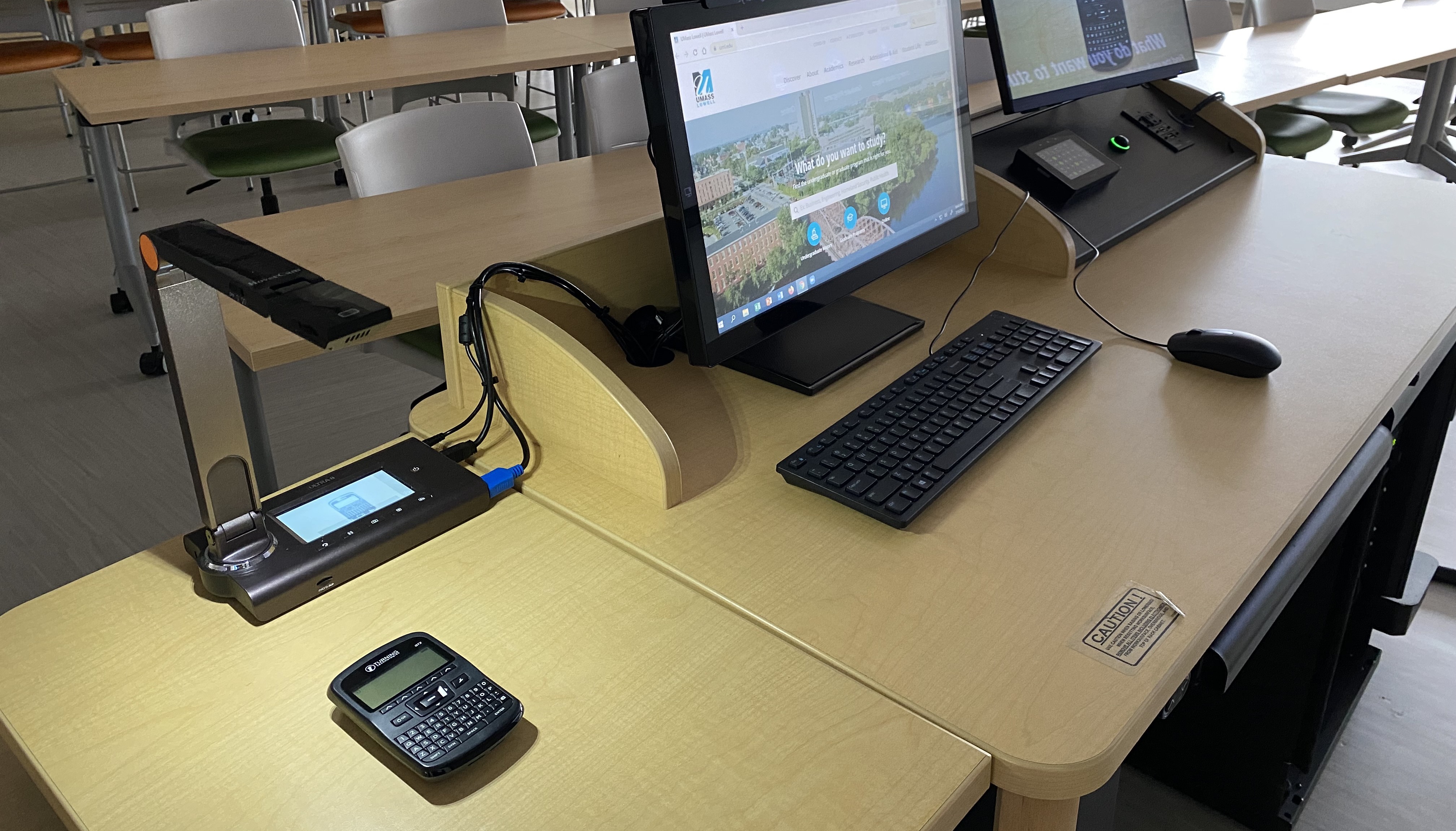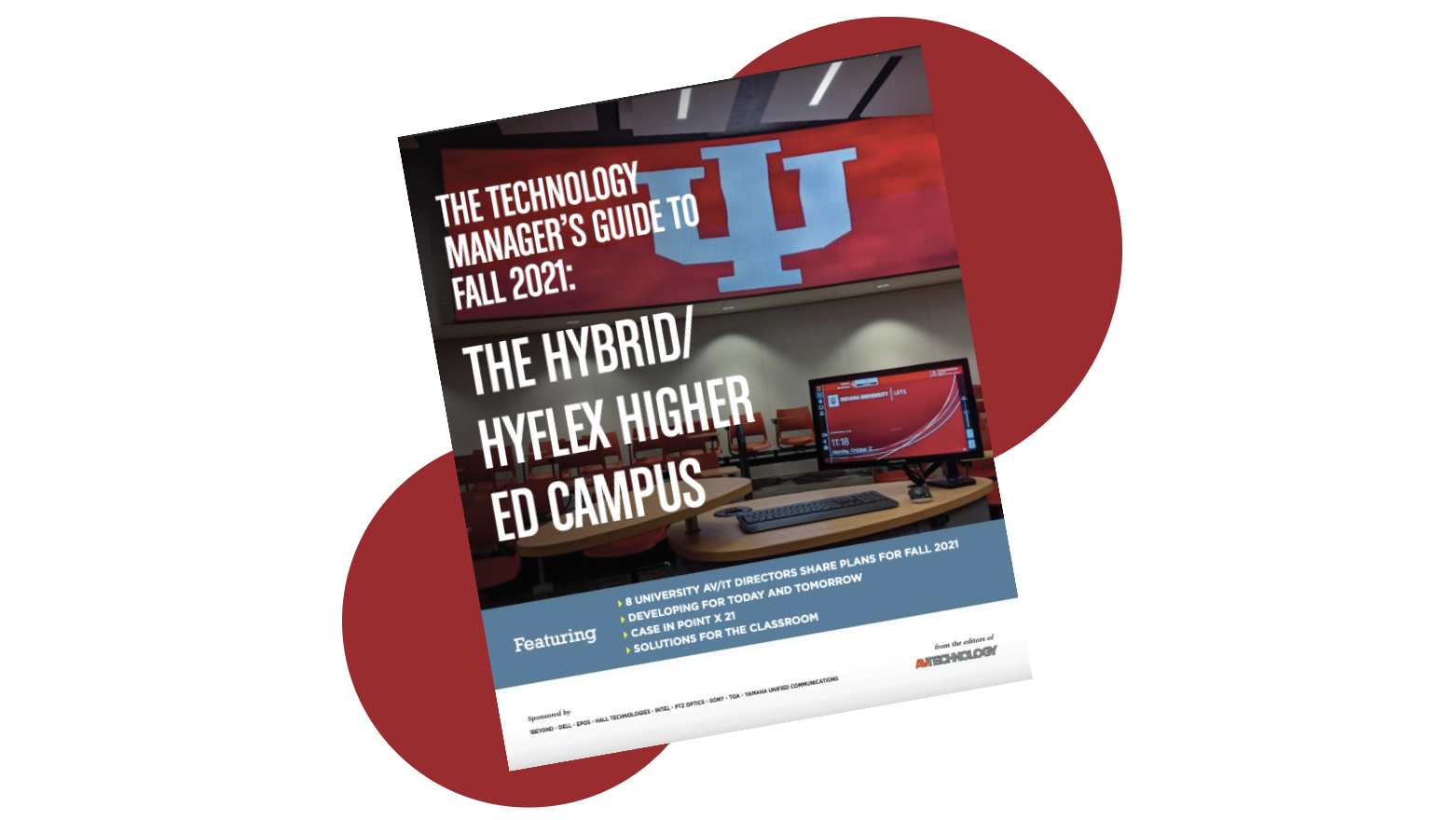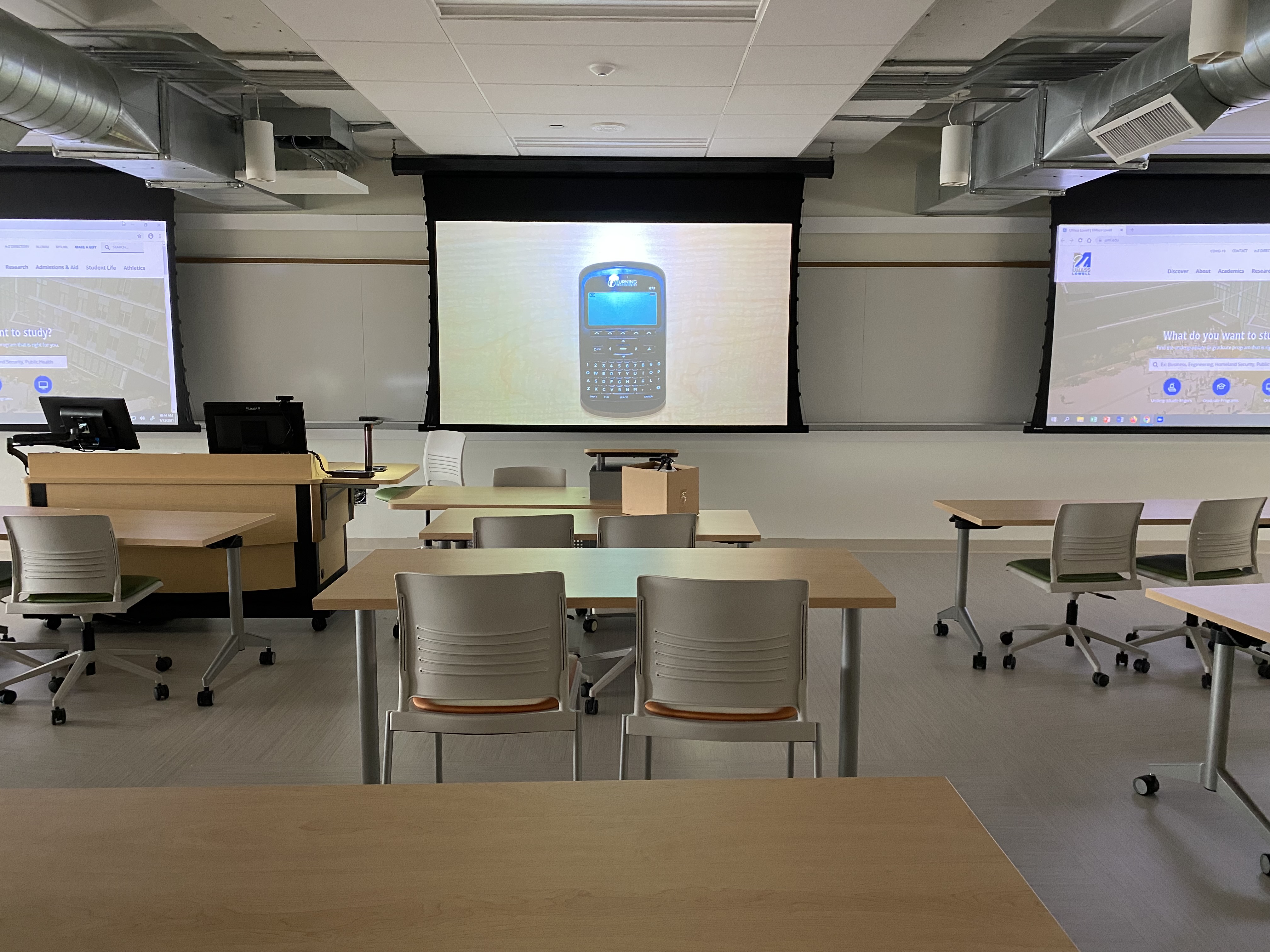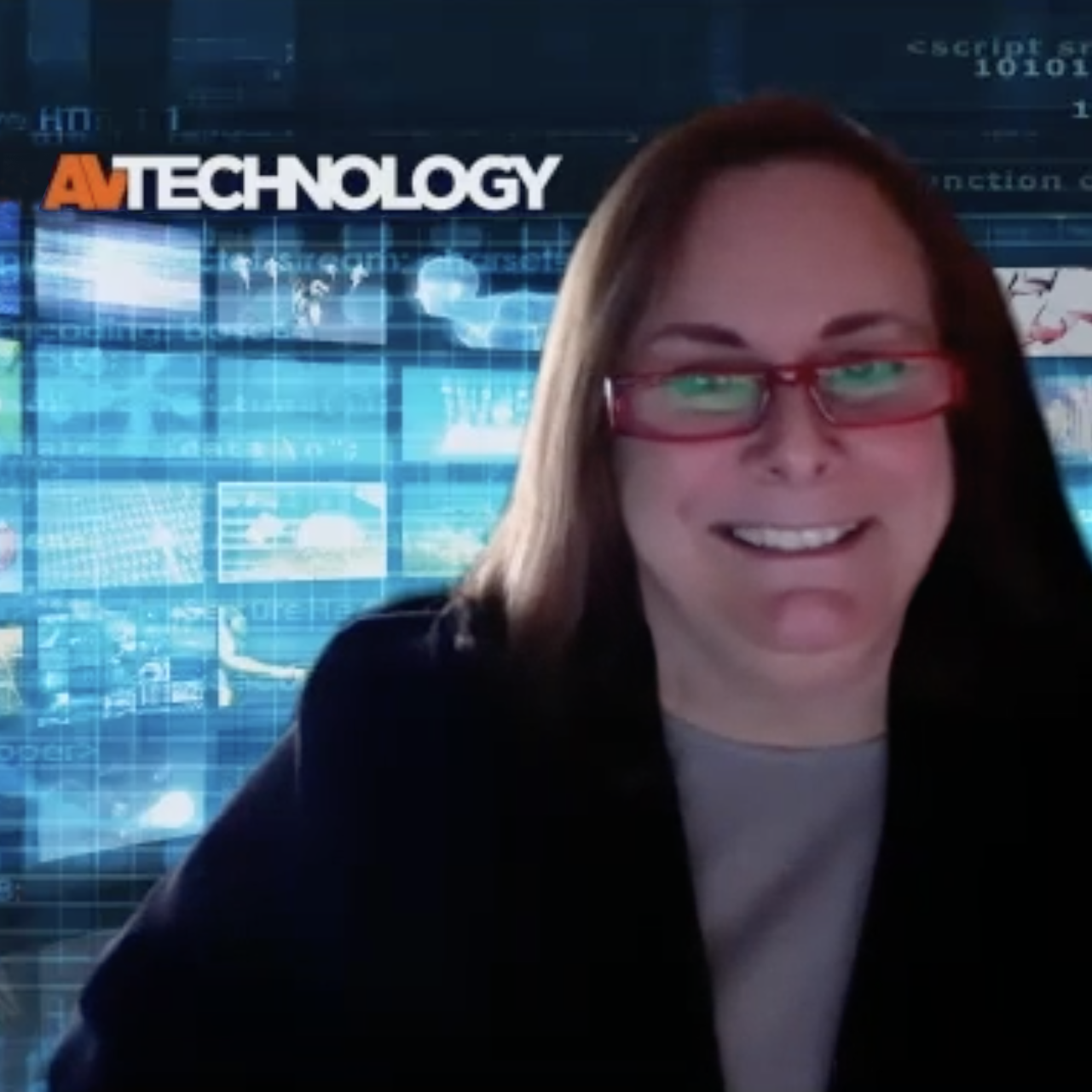Spotlight on University of Massachusetts Lowell — 8 AV/IT Tech Directors Share: Fall 2021 – The Hybrid/HyFlex Higher Ed Campus
UMass Lowell migrated around 2,700 courses into the LMS over a weekend once the pandemic hit.

A daily selection of features, industry news, and analysis for AV/IT professionals. Sign up below.
You are now subscribed
Your newsletter sign-up was successful
AV Technology content director Cindy Davis sat down with the AV/IT directors from eight universities to learn how they are approaching the 2021–22 school year. Some are returning to pre-pandemic status with few reconfigured classrooms for hybrid learning, others are all-in with hybrid, or HyFlex modalities, while others are in transition and planning for the future.
We’ve created a series of spotlights that provide an in-depth conversation with university AV/IT directors, which will be posted here on AVNetwork throughout September.
For a snapshot of all eight universities, plus industry thought leadership, and an extensive list of products for the hybrid and HyFlex classroom, download The Technology Manager's Guide to Fall 2021: The Hybrid/HyFlex Higher Ed Campus.
University of Massachusetts Lowell

Mike Lucas, Sr.
Director of Instructional Technology
Q: Pre-pandemic, what percentage of classes (if any) were set up as hybrid or HyFlex? What are plans for fall classes?
A: We had very few hybrid course offerings at UML before the pandemic. Most of the hybrid activity was delivered out of the GPS (Graduate Program Studies) department. Hybrid on campus was classified as some on-campus instruction supplemented by Blackboard course delivery.
For the Fall 2021 semester, we expect 100 percent of in-person classes to be delivered in a similar manner to what we did before the pandemic. All classrooms will have the ability to record and/or stream live to remote participants. Some of the classrooms will have the ability to interact with faculty in the brick-and-mortar classrooms from remote locations. We are setting up three HyFlex classrooms—with beamforming microphones, multiple monitors, tracking cameras, et cetera—that will be used initially for delivery of graduate engineering courses to local industry. These classrooms will also be available to regular undergraduate courses during the day. Only a small percentage of courses will be delivered in a HyFlex environment, however.
Spotlight on 8 AV/IT Tech Directors
>> Spotlight on Boston University
A daily selection of features, industry news, and analysis for tech managers. Sign up below.
>> Spotlight on Brandeis University
>> Spotlight on The Brookings Institution
>> Spotlight on Indiana University
>> Spotlight on University of Massachusetts Lowell
>> Spotlight on the University of North Carolina – Wilmington
>> Spotlight on the University of Southern California
>> Spotlight on Western Kentucky University
Q: Have in-person classes resumed?
A: In the Spring of 2021, roughly 25 percent of the in-person classes resumed. Most of these courses were smaller in size (fewer than 25 students) to allow for social distancing. All classes over 50 students were remotely delivered using Zoom or Blackboard Collaborate and supplemented with online course material.
Q: In what ways is your department gearing up for the fall different than if the pandemic not happened?
A: We have created virtual computing spaces for the fall—primarily the College of Management Bloomberg Lab and the Art Department MAC labs. These labs were typically open to students only during business hours, but by adding a virtual component to these spaces, students will have 24/7 access to these resources. Additionally, all classrooms are now equipped with web cameras and microphones to easily deliver the course material remotely, should the need ever arise again… God, let’s hope not!

Download The Technology Manager's Guide to Fall 2021: The Hybrid/HyFlex Higher Ed Campus
Q: Have more classrooms been outfitted with remote technologies specifically because of the pandemic?
A: At minimum, all classrooms have a web camera, microphone, and Zoom loaded on the teaching station. Forty-five percent of the classrooms include lecture capture technology (Echo360 and MediaSite) for no-touch recording and live streaming.
Q: Key challenges?
A: Our initial challenges were to get a large number of courses into the LMS. We migrated around 2,700 courses over a weekend once the pandemic hit. Getting faculty up to speed with Blackboard and Zoom were the biggest challenges at the start of the pandemic. All of the staff in Instructional Technology were moved to support faculty—live calls, emails, and a ticketing system—in order to get content online. As we moved into the summer, the focus shifted towards formalized training for faculty, course development, and distribution of equipment—iPads, document cameras, and laptops—in order to meet the need for Fall of 2020. The formalized workshops were recorded and archived for faculty to revisit. This was a successful tool and faculty response was overwhelming, but distribution of equipment was challenging due to social distancing, so we set up “drive-by” pickup locations. Faculty queued up in their vehicles, presented IDs, and popped the trunk to receive the equipment. It was a low-tech solution, but effective and safe.

Q: Do you have advice for your peers on training faculty to use new hybrid classroom technologies?
A: We will be running a series of workshops on the hybrid classroom technology recently installed in the classrooms. The good thing is most faculty are now very familiar with Zoom course delivery, and so the migration from home delivery of instruction to classroom delivery of instruction, to a remote audience, is not a long leap.
Q: Parting Thoughts?
A: The Fall 2021 semester does not seem as daunting as the previous 18 months. Faculty have elevated their technology skills—some forced kicking and screaming—but the comfort level has risen. There have been some great uses of technology during the pandemic. One that comes to mind is the incorporation of iPads in course delivery. Faculty now want to use this technology in their face-to-face course delivery. The challenge for IT is to make that happen as seamlessly on campus as it was in their homes. Some networking restrictions that we have addressed with software loaded on all classroom computers, will allow these connections to happen.

Cindy Davis is the brand and content director of AV Technology (AVT). She was a critical member of the AVT editorial team when the title won the “Best Media Brand” laurel in the 2018 SIIA Jesse H. Neal Awards. Davis moderates several monthly AV/IT roundtables and enjoys facilitating and engaging in deeper conversations about the complex topics shaping the ever-evolving AV/IT industry. She explores the ethos of collaboration, hybrid workplaces, experiential spaces, and artificial intelligence to share with readers. Previously, she developed the TechDecisions brand of content sites for EH Publishing, named one of the “10 Great Business Media Websites” by B2B Media Business magazine. For more than 25 years, Davis has developed and delivered multiplatform content for AV/IT B2B and consumer electronics B2C publications, associations, and companies. A lifelong New Englander, Davis makes time for coastal hikes with her husband, Gary, and their Vizsla rescue, Dixie, sailing on one of Gloucester’s great schooners and sampling local IPAs. Connect with her on LinkedIn.
